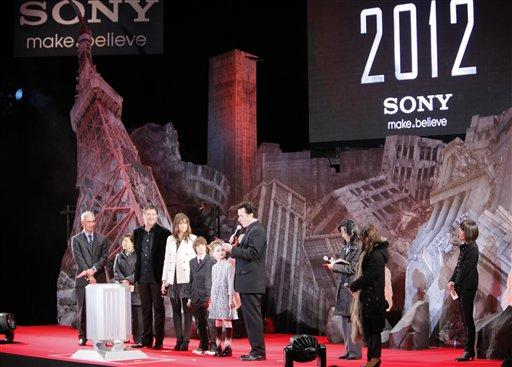For those who can’t wait for the Earth’s looming destruction in three years’ time, the future starts now in director Roland Emmerich’s aptly, ominously titled “2012.”About 3,000 years ago, the Mayans, a highly developed but primitive civilization in the Southern American continent, predicted the world would end in 2012. They also foretold the American president would be an African American, but instead of orator Barack Obama, we get stuck with an inarticulate gray-haired Thomas Wilson (Danny Glover). The Mayan civilization also had the good sense to die out rather than watch the film steal part of their history for blockbuster thuds and pyrotechnics.It’s 1999, and Adrian Hemsley (Chiewetel Ejiofor), a special adviser to the president on scientific affairs, has discovered the Earth is heating up. Apparently, the neutrinos generated by the sun are causing the Earth’s core to melt. This could upset the Earth’s magnetic stability, triggering a trend of events capable of swishing the planet. President Wilson, Hemsley and world leaders then begin a plan to build ships to safeguard the best of the human species. The ships are built in China, where labor is cheap and the government has no qualms squashing internal opposition to the project. A side story involves failed science fiction writer Jackson Curtis (John Cusack) and his attempt to board the ships. Along the way Curtis butts heads with his wife, her plastic surgeon boyfriend, his children and several federal agents monitoring Yellowstone National Park.Aesthetically pleasing and jarring in equal measure, “2012” replaces stunt work with computer-generated graphics and blazing, leading music by Harold Kloser, yet skips on rapidly edited MTV-style shots — Michael Bay’s preferred technique — in favor of a steady composition. Emmerich fancily captures the melee in the background, whether it’s frenetic passengers waiting to occupy the ship or the careening automobiles smashing into each other as the Golden Gate bridge snaps. Nevertheless, it’s asking a lot from the audience to believe a car could drive on disintegrating tarmac or a plane take off from a fractured runway then fly between collapsing skyscrapers. Five years ago, in his film “The Day After Tomorrow,” Emmerich presented a scenario in which climatologist Terry Rapson posited the coming of a new Ice Age. It means in the space of a decade, the Earth will be destroyed both by fire and ice — talk of a filmmaker blowing hot and cold.Several questions are flimsily tossed by “2012.” If the United States is going to be swallowed by a giant earthquake on Christmas Day, should the public be informed? One character argues it is sometimes necessary to hide the truth from the public to preserve society from descending to chaos. Another disagrees, feeling giving people the information and letting them help each other “is what makes us human.”Secondly, to secure a spot on the ship is about the same amount an alumnus needs to obtain LSU Tiger season tickets: merely $1 billion a pop. This seems like a form of natural selection by balance sheet. Yet Hemsley disagrees and demands everyone who can should get on board. So what criterion should be used in choosing people to be saved from a cataclysm? Should it be race, lottery, finances or intellect? To posit, like Hemsley does, the public should be allowed on the ships is naïve. Regardless of the basis, there’ll be some form of discrimination in determining the chosen few. The difference between fiction and reality is manifest in “2012.” For those who survived hurricanes Katrina and Rita but saw lives lost and property submerged, the film seems the work of an armchair philosopher, a person unconcerned with how many people are sacrificed as long as his audience bellows in satisfaction. Freke Ette is a political theory graduate student from Uyo, Nigeria. Follow him on Twitter@TDR_fette.– – – -Contact Freke Ette at fette@lsureveille.com
Freke Friday: ‘2012,’ or how to make a reservation for Noah’s Ark
November 19, 2009

U.S. actor John Cusack, fourth from right, speaks to fans during the Japan premiere of the global-disaster tale 2012 in Tokyo, Japan, Tuesday, Nov. 17, 2009. Looking on him from left are




